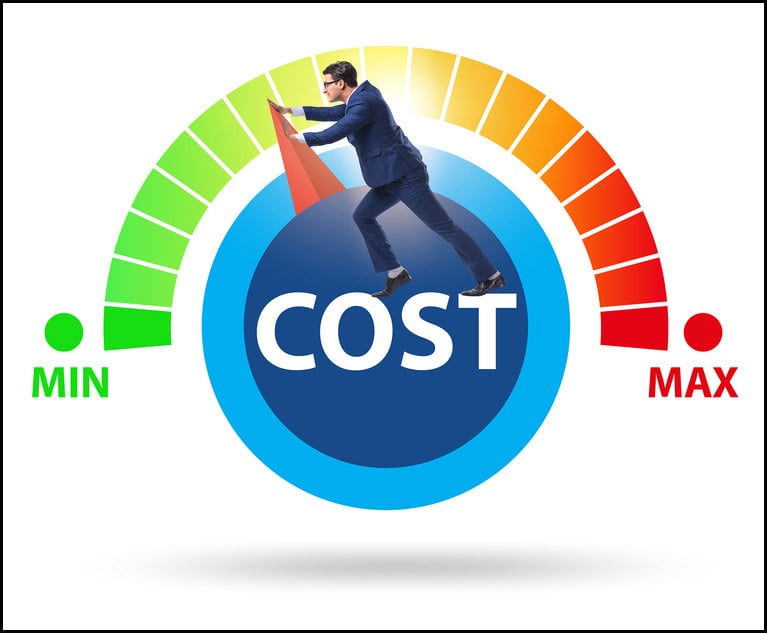Law Firms Are Finally Making Moves to Standardize and Streamline Billing Processes
For years, law firms have experienced pushback from clients on their billing processes. And while firms are working to redefine the billable hour and…
December 27, 2017 at 12:23 PM
5 minute read
The original version of this story was published on Law.com

For years, law firms have experienced pushback from clients on their billing processes. And while firms are working to redefine the billable hour and implement new solutions like e-billing technology and data analytics platforms, there's still a lot of work to be done.
To gain better insight into law firms' billing practices and the steps they're taking to improve them, HBR Consulting surveyed 25 top law firms and found that clients are becoming more dependent on performance metrics. In fact, 67 percent of law firms have had a client ask them to provide real-time views into unbilled time, while 58 percent have had a client or other third-party vendor request at least one billing audit in the past year. Nearly half (48 percent) of firms have a month-end time entry deadline combined with a daily or weekly requirement to ensure timely invoicing.
Additionally, 76 percent of law firm respondents have also implemented incentives to ensure timely hours entry. Almost all (96 percent) firms quantify the amount of time their legal support staff spends on the total billing process, up from the 85 percent that did so last year. Clearly, law firms are trying to streamline the billing process, with 60 percent of firms planning to change legal support staff involvement in the billing process over the next three years.
Sharon Quaintance, senior director at HBR Consulting, sat down with Inside Counsel to discuss the findings and how firms can better manage and improve their billing practices. The intensity with which corporate counsel have pushed back on law firm billing has increased, and is often based on internal pressures to reduce expenses and/or meet quarterly financial forecasts. In addition, corporate counsel business management skills have become more sophisticated over time, with law departments adding more legal operations personnel. According to Quaintance, as the Association of Corporate Counsel has continued to emphasize examples of pricing and billing improvements, more law departments have sought to use these more creative approaches, often with the goal of better predictability and transparency.
In general, the legal industry is notoriously slow to adapt to change. Some experts have even blamed the bar associations for having created barriers to entry, while others have focused on the lack of business acumen among both inside and outside counsel.
“But, in nearly all the cases that I have observed, advancements in pricing and billing solutions–or lack thereof–come down to leadership,” she explained. “Whether it is inside or outside counsel, it takes top-down commitment to change attorney behavior related to pricing, time entry and billing practices, along with a deft hand that can identify opportunities and maneuver obstacles to make meaningful improvements.”
In addition, there are more improvements needed than simply just changing billing, per Quaintance. The most advanced law firms understand that they must effectively manage the entire client matter lifecycle–from understanding their clients' needs and expectations about pricing and on-going communication through correctly setting up the new matters, complying with clients' guidelines and providing budget-to-actual transparency. When done correctly, communication is the key part of the success of any new solutions. Changes often occur slowly because some law firms' leadership teams have not educated their attorneys about clients' expectations regarding management of the entire client matter lifecycle.
According to Quaintance, the key law firm billing practices are: time entry by timekeepers; creation of pre-bills for attorneys to review; edits to pre-bills for consistency, accuracy and integrity; e-bill or distribute bill; and verify successful e-bill submission and correct and/or resubmit if needed.
“There is considerable focus on improving billing-related policies and procedures particularly related to more prompt time entry, standardized narrative entries and additional quality control steps. Many firms are assessing their current billing staff using more clearly defined performance metrics and investing in training as an on-going area of focus,” she explained.
So, how can firms better manage and improve their billing practices?
The greatest opportunity for improvement rests with the executive partner team, per Quaintance. In many cases, law firm CFOs know what needs to be done to meet or exceed clients' expectations, as well what management changes are needed to improve billing staff structures, processes and technologies. However, the finance team needs the support of leadership and ultimately the partnership to make the necessary changes – using industry best practices and data on client expectations can support these change management efforts.
She added, “Clearly defined policies, plans and unwavering top-down support are critical to the overall success of improved billing practices.”
Amanda G. Ciccatelli is a Freelance Journalist for Corporate Counsel and InsideCounsel, where she covers intellectual property, legal technology, patent litigation, cybersecurity, innovation, and more.
This content has been archived. It is available through our partners, LexisNexis® and Bloomberg Law.
To view this content, please continue to their sites.
Not a Lexis Subscriber?
Subscribe Now
Not a Bloomberg Law Subscriber?
Subscribe Now
NOT FOR REPRINT
© 2025 ALM Global, LLC, All Rights Reserved. Request academic re-use from www.copyright.com. All other uses, submit a request to [email protected]. For more information visit Asset & Logo Licensing.
You Might Like
View All
Are Firms and In-House Teams Courting Technological Debt With Ambitious Purchases?
6 minute read
From Reluctant Lawyer to Legal Trailblazer: Agiloft's GC on Redefining In-House Counsel With Innovation and Tech
7 minute read
Legal Tech's Predictions for Legal Ops & In-House in 2025

Legal Departments Dinged for Acquiescing to Rate Hikes That 'Defy Gravity'
4 minute readTrending Stories
Who Got The Work
J. Brugh Lower of Gibbons has entered an appearance for industrial equipment supplier Devco Corporation in a pending trademark infringement lawsuit. The suit, accusing the defendant of selling knock-off Graco products, was filed Dec. 18 in New Jersey District Court by Rivkin Radler on behalf of Graco Inc. and Graco Minnesota. The case, assigned to U.S. District Judge Zahid N. Quraishi, is 3:24-cv-11294, Graco Inc. et al v. Devco Corporation.
Who Got The Work
Rebecca Maller-Stein and Kent A. Yalowitz of Arnold & Porter Kaye Scholer have entered their appearances for Hanaco Venture Capital and its executives, Lior Prosor and David Frankel, in a pending securities lawsuit. The action, filed on Dec. 24 in New York Southern District Court by Zell, Aron & Co. on behalf of Goldeneye Advisors, accuses the defendants of negligently and fraudulently managing the plaintiff's $1 million investment. The case, assigned to U.S. District Judge Vernon S. Broderick, is 1:24-cv-09918, Goldeneye Advisors, LLC v. Hanaco Venture Capital, Ltd. et al.
Who Got The Work
Attorneys from A&O Shearman has stepped in as defense counsel for Toronto-Dominion Bank and other defendants in a pending securities class action. The suit, filed Dec. 11 in New York Southern District Court by Bleichmar Fonti & Auld, accuses the defendants of concealing the bank's 'pervasive' deficiencies in regards to its compliance with the Bank Secrecy Act and the quality of its anti-money laundering controls. The case, assigned to U.S. District Judge Arun Subramanian, is 1:24-cv-09445, Gonzalez v. The Toronto-Dominion Bank et al.
Who Got The Work
Crown Castle International, a Pennsylvania company providing shared communications infrastructure, has turned to Luke D. Wolf of Gordon Rees Scully Mansukhani to fend off a pending breach-of-contract lawsuit. The court action, filed Nov. 25 in Michigan Eastern District Court by Hooper Hathaway PC on behalf of The Town Residences LLC, accuses Crown Castle of failing to transfer approximately $30,000 in utility payments from T-Mobile in breach of a roof-top lease and assignment agreement. The case, assigned to U.S. District Judge Susan K. Declercq, is 2:24-cv-13131, The Town Residences LLC v. T-Mobile US, Inc. et al.
Who Got The Work
Wilfred P. Coronato and Daniel M. Schwartz of McCarter & English have stepped in as defense counsel to Electrolux Home Products Inc. in a pending product liability lawsuit. The court action, filed Nov. 26 in New York Eastern District Court by Poulos Lopiccolo PC and Nagel Rice LLP on behalf of David Stern, alleges that the defendant's refrigerators’ drawers and shelving repeatedly break and fall apart within months after purchase. The case, assigned to U.S. District Judge Joan M. Azrack, is 2:24-cv-08204, Stern v. Electrolux Home Products, Inc.
Featured Firms
Law Offices of Gary Martin Hays & Associates, P.C.
(470) 294-1674
Law Offices of Mark E. Salomone
(857) 444-6468
Smith & Hassler
(713) 739-1250






